Bertagnolli Presides Over Her Final ACD Meeting
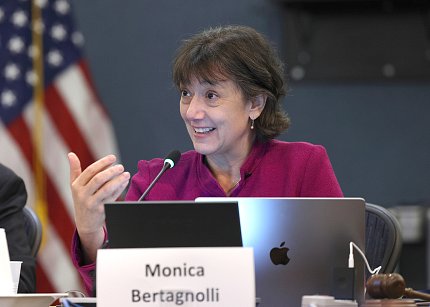
Photo: Chia-Chi Charlie Chang
Five weeks before a new Administration would take the helm, NIH Director Dr. Monica Bertagnolli delivered her last report to the Advisory Committee to the Director (ACD), highlighting programs and priorities she hopes will remain embedded in the fabric of the agency.
“All times of transition are challenging, but unwavering commitment to our mission on behalf of the American people grounds us,” Bertagnolli told attendees of the two-day, 129th meeting of the ACD, held virtually in December. “We can all move forward with optimism and energy as we navigate changes brought by a new Administration.”
Bertagnolli’s report to the ACD touted ongoing priorities she has championed and built upon during her time as director—advancing scientific integrity; promoting inclusivity; expanding access to care and revolutionizing data science.
“Scientific integrity is a core of what we do at NIH,” she said, urging consistent attention and review so that policies are responsive to evolving challenges.
“Ensuring the highest level of scientific integrity, public accountability and social responsibility in the conduct of science is paramount to cultivating trust,” Bertagnolli said. NIH’s Scientific Integrity Policy, which went into effect in recent weeks, “aims to ensure scientific findings are objective, credible and readily available to the public, and that the development and implementation of policies and programs are transparent, accountable and evidence based.”
Another new policy to enhance biosecurity and dual-use research oversight goes into effect in May. These guidelines, she explained, strengthen oversight on pathogens research to promote innovation while mitigating risks.
Expanding access to care
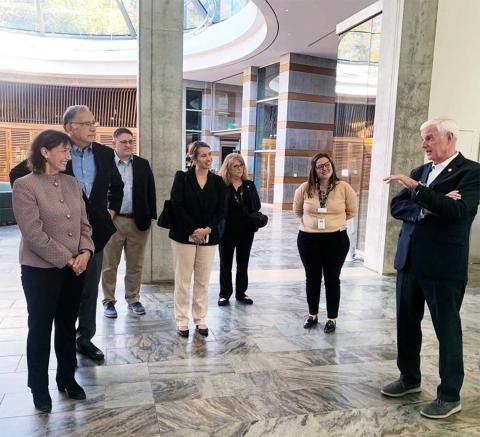
Photo: The Office of Rep. Steve Womack
“We must bring the benefits of research to all Americans regardless of where they live,” Bertagnolli said. “We know that meaningful engagement between communities and researchers is essential and leads to higher quality science, engenders trust in science…and focuses research on the issues most important to diverse communities. Without this, we run the risk of only serving the few, and we are here to serve everyone.”
A major initiative now underway to expand care across the country—a project born out of ACD input—is CARE for Health, NIH’s new primary care-based research network that connects providers and patients to research. The two-year pilot program supports three university-based hubs that will partner with rural communities and other underrepresented populations to test treatments for pain, drug addiction and gout.
Inclusion and diversity, which resonated throughout the meeting, are themes that permeate initiatives across the agency. The committee heard from Dr. Marie Bernard, chief officer for scientific workforce diversity, who retired at the end of December. She reflected on recent efforts such as Engagement and Access for Research-Active Institutions (EARA), which aims to address disparities in research opportunities and outcomes.
“You need unique perspectives at the table to get the best science,” Bernard reiterated.
Responsive to the mission
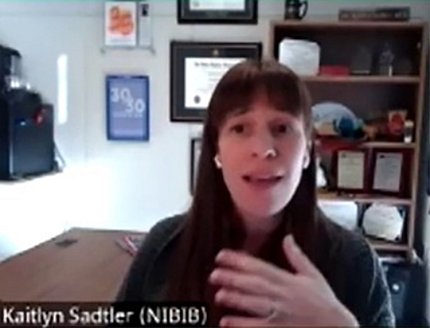
Day one of the ACD meeting included budget and legislative updates, and scientific reports from intramural researchers. Throughout the day, Bertagnolli updated the ACD on progress toward implementing the committee’s recommendations.
In recent months, the Scientific Management Review Board (SMRB)—which makes recommendations to the HHS secretary and NIH director on establishing or consolidating NIH institutes, centers and offices—got a reboot. The board is currently evaluating NIH’s current structure, including recent congressional proposals on reorganization.

And the Novel and Exceptional Technology and Research Advisory Committee (NeXTRAC) continued efforts to collect public input on scientific, safety and ethical issues associated with emerging biotechnologies. The committee held focus groups with rural and urban communities around the country.
“We’re serious about turning feedback into action,” said Dr. Lyric Jorgenson, NIH associate director for science policy.
Attention also turned to addressing the concerns of people with disabilities. An ACD working group had recommended removing the language “reducing disability” within NIH’s mission statement. A public Request for Information indicated more input is needed before finalizing a new mission statement.
Adam Politis, acting senior advisor for disability research, said research continues to address medical, health, social and environmental factors affecting persons with disabilities. At NIH, he said, it’s a priority to ensure facilities and technology are made accessible so everyone can use them.
Bertagnolli underscored the need to “move forward with new technology in a responsible way so everyone benefits.”
Using data for discovery
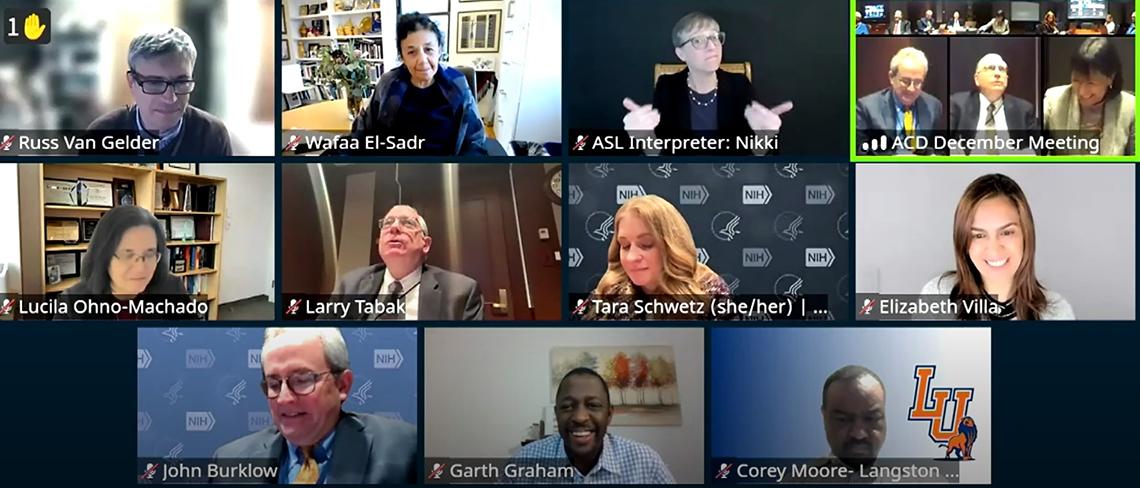
A new ACD working group is evaluating information technology and cybersecurity at NIH. Efforts are underway to enhance NIH’s standing as a trusted data broker. Discussion continued about the committee’s vision for the National Library of Medicine to become a platform for biomedical discovery and data-powered health.
“We have been working to implement a cross-agency initiative that would provide a focus for privacy-protected use of data collected from the clinical care environment to generate evidence required for decision-making to improve health,” Bertagnolli said. There are initiatives across the agency, she noted, to consolidate data-reporting and safeguard the information, so that patients can control how and why their data is used.
One large initiative involving patient data is RECOVER, an ongoing program to study and treat Long Covid. “We’ve made progress in understanding risk factors, the broad range of symptoms, the impact of vaccination and health disparities,” Bertagnolli said. “We’ve amassed and shared data from patient cohorts, conducted pathobiology studies and we’ve begun clinical trials.”
The deidentified data generated so far, from sites across the country, is spurring collaboration and discovery while informing future studies. This is just the beginning, she promised.
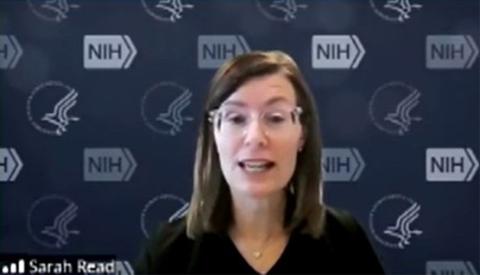
Dr. Sarah Read, deputy director of the National Institute of Allergy and Infectious Diseases, detailed ongoing efforts to launch RECOVER-TLC, which will focus on clinical trials of candidate treatments for Long Covid. So far, hundreds of candidate interventions have been submitted to the RECOVER-TLC public portal for consideration for further testing. These agents include antivirals, immunomodulatory agents, neurological agents and others.
The program aims to develop clinical trials with adaptive design “to stop what isn’t working early and quickly take on new, promising candidates.” Read also stressed the importance of involving people living with long Covid in every step of research design and implementation.
Fighting cancer
Dr. Kimryn Rathmell, National Cancer Institute director, discussed the ongoing impact of Cancer Moonshot, which has transformed cancer science and “shaped incredible advances and opportunities for progress.” Since its inception, the effort has significantly advanced immunotherapy as a treatment approach, expanded early-detection capabilities and enabled major progress in childhood cancer treatments.
Rathmell highlighted patient-driven efforts, particularly in diagnostics, that are saving lives.
A decade ago, when Cancer Moonshot began, “it was fairly uncommon to do a large-panel genetic test on a patient’s tumor,” Rathmell said. “It was almost unheard of to do whole exome sequencing or full genetic sequencing. Those are things we do routinely today, and we would not have been ready to offer those, to understand the best practices to be able to interface with patients, had we not taken this step very early on.”
Focusing on basic science
Basic science, Bertagnolli said, underlies all research across NIH.
“When any [of the many] critical biological programs that ensure optimal functioning of our bodies are thrown out of balance, disease results,” she said. “A heuristic model for describing these programs reminds us of the value of fundamental research as it addresses underlying principles that span multiple organ systems and multiple diseases.”
One example is the ABCD Study, which National Institute on Drug Abuse Director Dr. Nora Volkow discussed on day two. The long-term study examines how substance use and such environmental factors as lead exposure, sleep, anxiety and video games affect adolescent brain cognitive development.
Day two of the ACD also included updates on Alzheimer’s disease research, Henrietta Lacks (HeLa) cell line genome data access and the Accelerating Medicines (AMP) partnership.
As Inauguration Day approaches, as the next chapter soon unfolds, Bertagnolli said, “I believe any administration can get behind our goal of serving the people who need us.”
